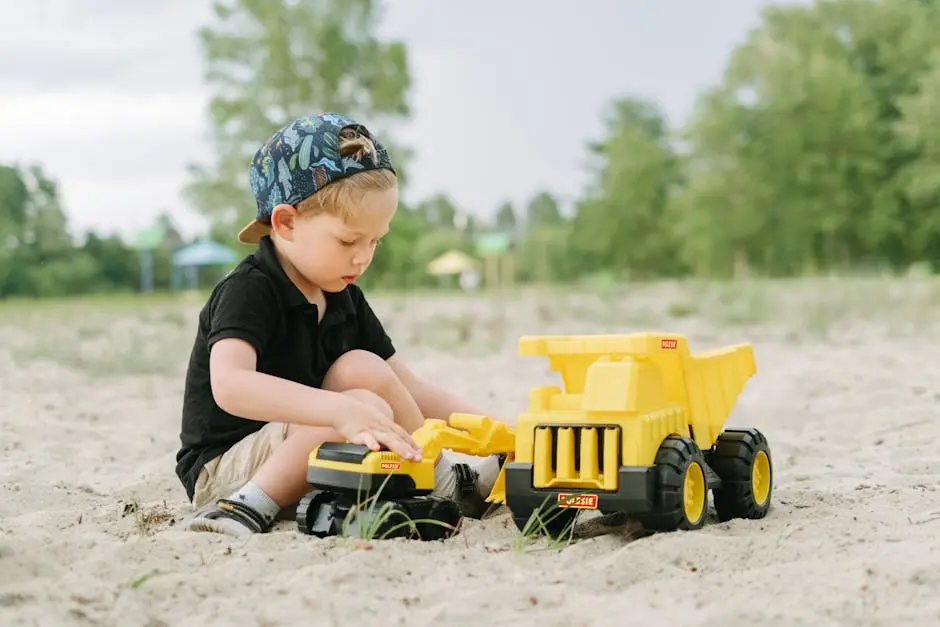What Are the Benefits of Toy Trucks for Child Development?

Toy trucks are a staple in many children’s playrooms, but their benefits go far beyond just fun and entertainment. In this blog, we will explore how toy trucks can aid in various aspects of child development, from motor skills to social interaction.
Enhancing Motor Skills
Playing with toy trucks helps children develop both fine and gross motor skills. Maneuvering the trucks, pushing them around, and loading and unloading objects can improve hand-eye coordination and dexterity.
Engaging with toy trucks provides kids with opportunities to refine their fine motor skills by grasping, holding, and manipulating small parts. This kind of play requires precision and attention to detail, which can significantly improve finger strength and dexterity over time.
Moreover, pushing the trucks along different surfaces helps strengthen larger muscle groups in the arms and legs, enhancing gross motor skills. This type of play can be particularly beneficial for toddlers who are in the critical stages of developing their foundational motor abilities.
For example, when children engage in activities like pushing a toy truck up a ramp or navigating it through an obstacle course, they are unknowingly practicing balance, coordination, and spatial judgment. These activities not only make physical exercise fun but also integrate essential developmental lessons seamlessly into playtime.
Fostering Creativity and Imagination
Toy trucks allow children to create their own scenarios and stories. They can imagine themselves as construction workers, drivers, or adventurers, which stimulates creative thinking and imaginative play.
This kind of open-ended play encourages children to think outside the box and come up with inventive solutions to problems. For instance, they might decide that their truck needs to rescue a toy animal from a mountain of pillows, leading to a series of imaginative decisions and scenarios that foster storytelling skills.
Toy trucks often come with features like moving parts and detachable components, which can further stimulate creativity. Children might use these elements to construct elaborate play scenes that mirror the real world, such as building a mini-construction site or organizing a race with friends. This kind of play can also be highly educational, helping kids learn about various roles and functions in society.
Such imaginative play can also be a great way for children to explore their own feelings and experiences. Through role-playing, they can act out different scenarios, express their emotions, and gain a better understanding of the world around them.
Enhancing Cognitive Skills
Toy trucks often come with various features like different shapes, sizes, and functions that can help children learn about concepts like cause and effect, problem-solving, and spatial awareness.
For example, figuring out how to fit a toy truck through a narrow passageway or how much force is needed to push it uphill provides practical lessons in physics and engineering. These experiences lay the groundwork for more complex cognitive tasks in the future.
Moreover, playing with toy trucks can improve counting and categorization skills. Kids often sort their trucks by size, color, or function, which introduces them to basic math concepts. They might also engage in sequencing activities, such as lining up trucks in a particular order or following specific patterns, which helps enhance memory and logical thinking.
Many toy trucks are designed to be part of larger playsets, requiring children to follow instructions and engage in step-by-step thinking. This process can develop planning and organizational skills, preparing kids for more structured learning environments.
Engaging in this type of play can also stimulate brain development by exposing children to new vocabulary and ideas. Terms like ‘excavator,’ ‘dump truck,’ and ‘crane’ become part of their lexicon as they learn about different types of vehicles and their purposes. This expanded vocabulary can enhance cognitive abilities and support language development.
Encouraging Social Interaction
Playing with toy trucks in group settings can encourage children to interact with their peers, share, take turns, and develop social skills. This kind of play can also help in building teamwork and communication skills.
For instance, when children play together with toy trucks, they often need to negotiate roles and agree on scenarios, which promotes collaborative problem-solving and effective communication. This type of interaction helps build empathy and understanding among peers.
Additionally, toy trucks can serve as excellent tools for breaking the ice and fostering friendships. Children who may be shy or reserved might find it easier to engage with others over a shared interest in toy trucks. This shared play can pave the way for deeper connections and more meaningful social interactions.
Group play with toy trucks also teaches important life skills such as patience and perseverance. Waiting for one’s turn, dealing with disagreements, and working together towards a common goal are all valuable lessons that children can carry into adulthood.
In Summary
Toy trucks provide a multitude of benefits for child development. They help improve motor skills, foster creativity and imagination, enhance cognitive skills, and encourage social interaction. Next time you see a child playing with a toy truck, remember that they are gaining valuable skills that will aid them in their growth and development.


















Leave a comment